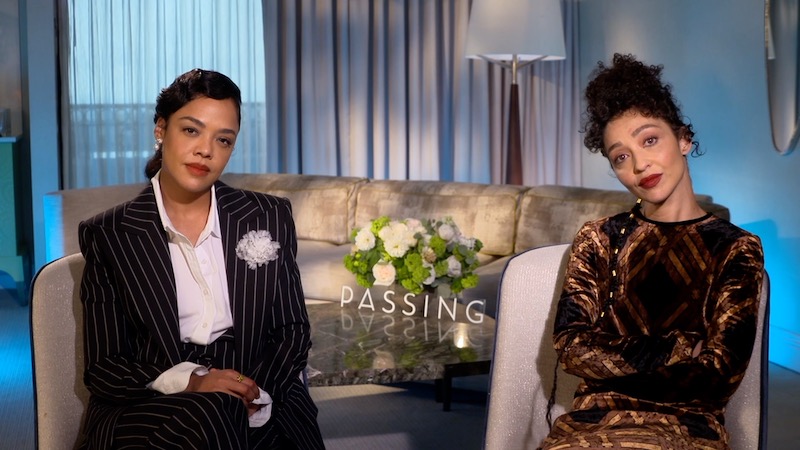Based upon the novella of the same name, the Netflix film Passing is now streaming. It stars Tessa Thompson and Clare Kendry as two Black women that can “pass” as white but live on opposite sides of the color line during the Harlem Renaissance in 1920s New York.
“After a chance encounter reunites the former childhood friends one summer afternoon, Irene (Thompson) reluctantly allows Clare (Negga) into her home, where she ingratiates herself to Irene’s husband (André Holland) and family, and soon her larger social circle as well,” says the official synopsis. “As their lives become more deeply intertwined, Irene finds her once-steady existence upended by Clare, and Passing becomes a riveting examination of obsession, repression and the lies people tell themselves and others to protect their carefully constructed realities.”
For ComingSoon’s Passing interview, Alyse Wax spoke with stars Tessa Thompson and Ruth Negga about the role and the conversations it will inspire.
Alyse Wax: Tessa, what drew you to this role?
Tessa Thompson: Oh, goodness. So many things. I think in a similar way that Irene is so drawn to Clare. I was drawn to the idea of getting to work with Ruth. I knew that she would play Clare, so when I read both the novella and Rebecca [Hall]’s brilliant film adaptation of it, I had Ruth in my mind. I have long been a fan of Rebecca’s work. So the idea of getting to play a role that is challenging and complicated as this with Rebecca as my second pair of eyes, and as my partner in it, felt really compelling. Then just the emotional landscape of the book. It’s not in the first person, but it’s very internal in terms of Irene’s experience and it’s dense. It’s 93 pages, but so much happens inside of her mind and heart that I found incredibly compelling too.
Ruth, how about you? What drew you to the role of Clare?
Ruth Negga: That beautiful slim novella that sort of… It was a life-changing moment actually because that’s still reverberating because I was so disarmed by her accuracy in terms of exploring the human psyche. The contradicting elements of our nature. The fighting elements of our nature, how we try and make ourselves into these cohesive beings, but fail and struggle with our darker sides and our shadow sides, against the backdrop of a perfect sort of concept, which is this concept of hiding, masking, pretending to be something we’re not, and who is really doing that. Who is ostensibly doing it explicitly and who is doing it sort of a more subtle way, and the contradictions and how we condemn certain people and we condone others. What does that entail?
Usually you kind of find yourself feeling well, we sort of applaud people who we see as upright members of society, who have… Someone termed it, I heard this week, it’s called the vanity of goodness. How we gain our self-esteem by being good. Nella [Larsen]’s book explores the cost of that, and also the cost of living your truth. We see really the condemnation of that by society and sometimes a critical eye on that.
Tessa, what kind of conversations do you hope this film springs?
Thompson: You know what? Really any [laughs]. I invite them all. I know that my favorite pieces of work are pieces that ask more questions and they answer, obviously, I think there’s like a very baseline question that people have at the end of it, sort of what happens at the end. That’s a conversation that I think is interesting. I think there’s this conversation around identity around this thing that Irene pauses, this idea that we’re all of us passing for something or other what Ruth was just speaking to. I think there’s an interrogation, there’s obviously a conversation around the history and legacy of passing in this country. I think our film, even when the trailer came out, there was a lot of robust conversation around colorism. That is really interesting.
So just any and all. I think my least favorite thing is you’ve made a piece of work that people can forget about as soon as it’s done. So I think for me, the thing that felt exciting about the novella and what Rebecca did, is it sort of stuck to the bones. I think anytime you’re you feel moved to have conversations about something that you’ve seen, it means that in part, it got under your skin. So I’m excited by all of it.










